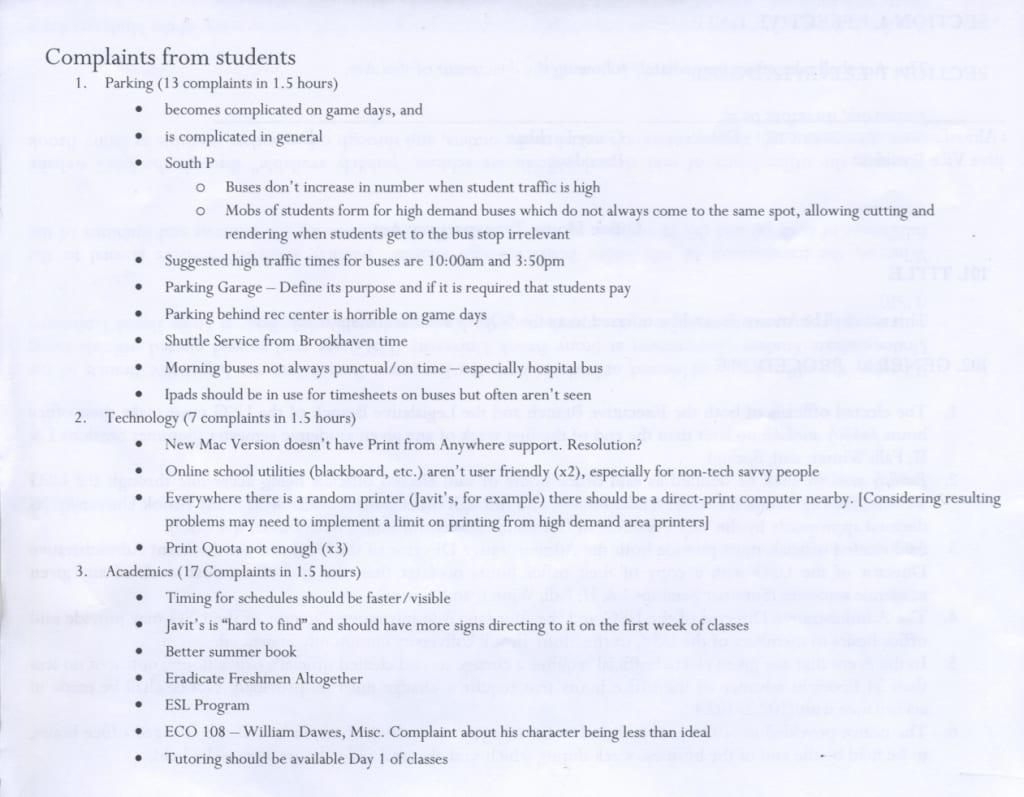The Undergraduate Student Government senate discussed the results of a student complaint survey and possible solutions at its meeting on Thursday, Sept. 11, with complaints ranging from technology, dining, and residences on the Stony Brook campus.
College of Engineering & Applied Sciences senator John Mele conducted the in-person survey, and Executive Vice President James Alrassi suggested delegating complaints to the appropriate committees.
One hotly debated issue by the senate was the size of the print quota for each student, which was lowered from 280 pages per week for the 2013-2014 year to 140 pages per week for the 2014-2015 year.
Lloyd Ippolito, the Residence Hall Association senator, cited a handout from the Department of Information Technology’s advisory board, which stated that only one percent of students printed over 140 pages per week.
Alrassi added Stony Brook University has the largest print quota out of any of the State University of New York institution. USG President Garry Lachhar, however, expressed skepticism over the rationale for lowering the quota.
“One of reasons for bringing the print quota down was that it would save money,” Lachhar said. “But if only one percent of people is spending that money to begin with, is it really being saved?”
College of Arts & Sciences senator Taylor Bouraad said printing out slideshows from lectures can take up a large amount of students’ print quotas.
“Especially with bio majors and classes, we have really long PowerPoints, and it’s like you print them and take notes on them,” Bouraad said.
Health Sciences senator Isabella Skomial voiced similar concerns.
“In this first week, already I’ve printed out journal articles, PowerPoints,” she said. “I see myself running out.”
The senate eventually created an ad hoc committee to deal with complaints related to technology, and Ippolito was elected as the chair of the committee.
When the senate moved on to complaints related to on-campus dining, Senior Class Representative Tyesha Jordan-Arnette said she often speaks to Campus Dining managers about her negative experiences.
Jordan-Arnette recalled one instance in which she claims to have spoken to a manager of Roth Cafe.
“I spoke to the manager, and she said that they don’t have to wear hairnets, which I don’t understand,” Jordan-Arnette said. “Nor do they have to wear gloves when they’re serving fries and stuff.”
When College of Arts & Sciences senator Nathan Blazon-Brown brought up the topic of food prices, Administrative Director Thomas Kirnbauer said that although there have not been across-the-board increases, specific food items may change in price.
“Those things have to be reviewed on an item-by-item basis,” Kirnbauer said, who is also the vice president of the Faculty Student Association’s board of directors.
Kirnbauer also pointed out a new student advisory board for Campus Dining has been created. The board meets Wednesdays at 4 p.m. in the Center for Science and Society in Roth Quad.
On the topic of complaints about residences, Blazon-Brown said not much can be done about requests for air conditioning in more residential buildings.
“I know in H and Mendy, the issues of heat are kind of hard to solve because those buildings are not meant to support ACs,” Blazon-Brown said. “And we cannot throw ACs in there because we will kill the buildings’ electrical. At least that is what I have been told.”
When Skomial spoke about the problem of humidity and mold in West Apartments, Blazon-Brown said he and other employees of Campus Residences checked for mold in the apartments during the summer.
“They’re paying us to look for mold when they could almost be paying to prevent mold from happening,” he said.
Mele said he and Bouraad were working on addressing complaints concerning residences, and Ippolito said that those complaints can also be brought before RHA.
The senate also passed the Office Hours Transparency Act by a vote of 18-0-2. The act, which was proposed by Vice President of Academic Affairs Steven Adelson, will require both senators and executive council members to make their office hours publicly available by the end of the first week of any academic semester, including winter and summer sessions.










